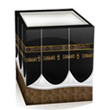Basmalah quietly in Prayer is Better
- Details
- Category: Sheikh Bin Baz
- Published on Monday, 04 November 2013 11:05
- Hits: 1005
Basmalah quietly in Prayer is Better
Question:
What is the ruling on Basmalah (reciting Basmillah) aloud when reciting Surah Al-Fatihah and other Surahs in prayer?
Answer:
Scholars have disagreed in this regard, some of them holding the view that it is preferred to say it aloud, while others said that it is disliked and that it is preferred to say it quietly - and this is the most authoritative opinion and the most preferred. This is because it has been authentically reported in a Hadith on the authority of Anas, may Allaah be pleased with him, that he said: The Prophet (sallallaahu alaihi wa sallam), Abu Bakr and Umar did not used to say: Bismillahir-Rahmanir-Raheem, aloud. [1] Numerous other Hadiths carrying the same meaning have been reported. In some Hadiths, it has been reported that it is preferred to say it aloud, but they are weak Hadiths. And we know of no clear Hadiths supporting the Basmalah aloud. However there is room for accommodation and ease in the matter and it should not be a cause of dispute. If the Imam sometimes recites it aloud in order that that the worshippers hear him saying it, there is no objection, although it is better that it be read quietly as a rule, in accordance with the authentic Hadiths.
[1] An-Nasai nos. 907-909 and Ibn Khuzaynah 496, 497.
Shaykh `Abdul-`Azeez Bin Baz
Fatawa Islamiyah Vol. 2 Page 254





















